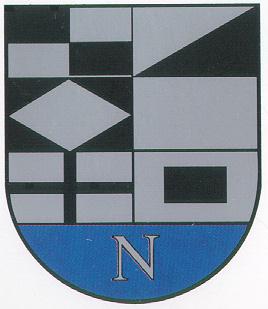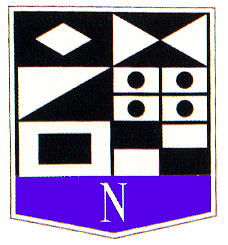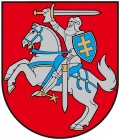Neringa
NERINGA
County : Klaipėda
| Lithuanian | blazon wanted |
| English | blazon wanted |
Origin/meaning
Neringa is not a true city, but a large municipality formed after the merger of several villages in 1961. The municipality borders the sea and the villages in the area were historically dependent on fishing. In the mid 19th century the Prussian inspectorate issued specific weathervanes for each of the villages. These weathervanes are combined in the arms, with the letter N as a symbol for the municipality in the base of the shield.
The present arms show the weathervanes of the following villages : Nida, Preila, Nidas Purvyne, Karvaiciai, Juodkrante and Pervalka.
The first arms issued for Neringa date from 1968 and had a similar design, except that different vanes were used (see below).
On these arms the fields represent the following villages : Nidos Purvyne, Rasyte, Preila, Juodkrante or Pilkopa, Pervalka and Nida. The arms were used only until 1970.
When the new arms were to be designed in 1997 it was clear that the old arms could no longer be used. Rasyte is now part of Russia and thus the Rayte vane had to be removed. Also the symbol of Juodkrante was shown wrongly, the village uses only a cross. To replace the symbol for Rasyte, it was decided to use the field for Karvaiciai, which, together with 16 other villages, is now buried under the sand, but it was a fishing village in the 19th century. As it had no own symbol, the field is shown empty.
The new arms were granted on February 18, 1997.
Lithuania heraldry portal
This page is part of the Lithuania heraldry portal |
Heraldry of the World |
|
Civic heraldry:
|
Other heraldry: |
Contact and Support
Partners:
Your logo here ?
Contact us
© since 1995, Heraldry of the World, Ralf Hartemink 
Index of the site
Literature: Rimsa, 1998













